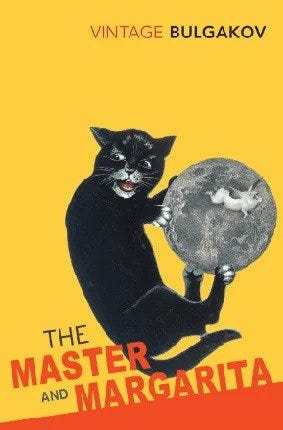

For me, this novel was about a search for truth. But what is this book about? Yes, the plot is easy enough: The Devil comes to Moscow, causes all sorts of trouble, then leaves, but that's not what the book is "about". And while many good people would scoff at the idea of religion being lumped into the same category as mere "fantasy", the idea of a naked witch riding a man turned into a pig over a sleeping Moscow is not that much harder to believe than an angel falling from heaven and corrupting all of mankind. And even that most serious of authors, Dostoevsky, wrote his best works about the struggles of man against the powers of the supernatural.

Gogol, who Bulgakov is most similar too, was famous for his absurdities: his story The Nose is about a man's nose that leads a life of its own. This scene seems so natural it's easy to forget we're getting the inner-monologue of a dog. Take, for example, a small scene in Anna Karenina where all of a sudden we get narration from the point of view of Levin's hunting dog. Russian literature gets a bad rap for being dry, thick, and dull, when the reality is much of the most respected Russian literature is filled with fantastic flights of fancy, and outrageous absurdities. This book was left incompletely edited when the author died, not being all that well acquainted with the rest of his work, which would explain some of the issues, but issues or not this book is a delightful read with a solid narrator. Additionally, the translation (Michael Karpelson, 2006) is my personal favorite and has the most personality (the others I have read are much more dry in their translation and it shows heavily in the dialogue). If you want a boring consistent drone of a voice, I think you are better listening to an automation than a legitimate audiobook.

I can't honestly understand the negative marks throughout the rest of audible. While the accents are all variously British, they are unique and he endows every character with a certain uniqueness and charisma (or lack thereof if the book should call for it) and should be beloved by all.

The narrator, which is quickly becoming the make or break factor of every audiobook I purchase, is, to my mind, remarkable. The language is wonderful and the imagery is perfectly evocative and I truly wished I had the option of reading more. The most interesting aspect of the novel for me were the moments when we are given a metafiction/history written by The Master. The satire is effectively humorist and blasts Soviet greed well, but then greed is a very easy thing to parody. However, title characters or not they are not there often and rarely without Woland or his minions at their side in order to make things interesting. The title characters are introduced about halfway through the novel and are an attempt to create some sort of deeply affecting love story, that I don't consider all that effective given that it is pretty much the sole aspect of their personality we see is them pining for one another. Marked with numerous interesting characters, Bulgakov creates a readable if somewhat uneven tale. The core of this piece is satire, marking a path of wanton destruction through Moscow as Satan and his delightfully hooligan entourage parade from one scene to another causing chaos and watching the aftermath in the name of.well, why the hell not? There is also a love story as well as retelling of the history of Pontius Pilate.


 0 kommentar(er)
0 kommentar(er)
